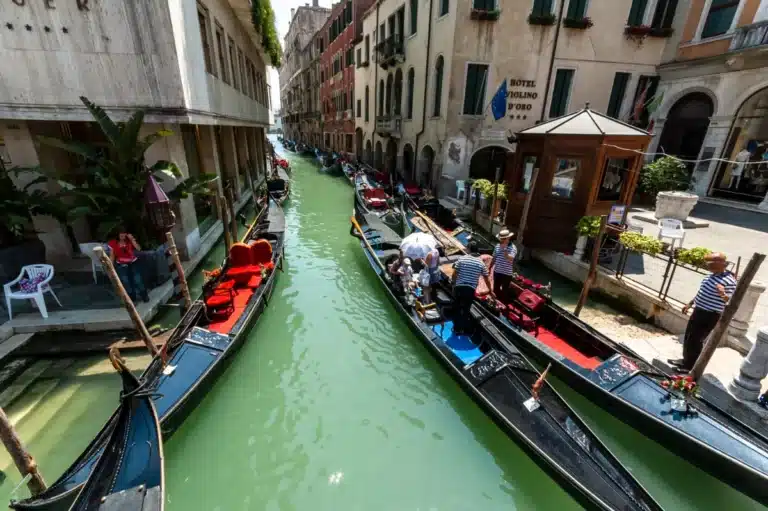Do They Speak English in Italy? Are you Planning to Visit?
In some parts of the world, people assume that you must be lost if you’re not local. They may not understand your language, and they might not be interested in trying.
This can be a frustrating experience for visitors to foreign countries. In Italy, however, many people try to speak English, even if their level of fluency isn’t perfect.
In fact, learning a few key phrases will get you pretty far in most situations. So don’t let the language barrier keep you from enjoying all that this beautiful country has to offer!
Do Italians speak English?

The answer to this question may vary, depending on the person answering it.
Only around 30% of Italians claim to speak English. However, this is true only in big cities like Rome, Milan, Florence, or Venice. When in smaller towns, they will most likely not speak any English at all.
The more common answer is that Italians do not speak English.
Italians do not speak very much English because they are too busy with school and work or live in rural areas where opportunities to interact with foreigners are scarce.
Italians have a reputation for being bad at learning languages. They’re known as one of the worst in Europe.
Although an Italian may not know English or speak it well, they will usually understand more than they let on. As long as the English speaker is not sputtering, chances are that Italians can know at least some of what you’re saying.
Italians who don’t speak English won’t go out of their way to help you with your English. They may pretend they don’t know any English just so they can avoid talking to you.
Bilingual people will often switch between their two languages, sometimes in the same sentence.
It is not uncommon for an Italian to say “I don’t speak English very well” in English and continue in Italian. An English speaker can try to mirror their conversation partner’s switching by speaking some Italian.
What languages are spoken in Italy?
Many people assume that Italy is a single, homogenous society and culture. But there are actually many different cultures in the country.
Each region has its own language and religion. And each city has its own dialect! Italian is the Official Language of Italy, but it’s far from the only one spoken here.
Italy has 34 distinct dialects, as well as the official Italian Language.
Since there are so many different languages spoken in Italy, it can be challenging for English speakers to navigate life here. Even if you speak some Italian, that’s not enough to get by just anywhere.
In southern Italy, the main languages include a dialect of Italian called Neapolitan, Sicilian, and the regional languages of Sardinia (Sardo).
People in northern Italy speak more standard Italian, but also dialects like Lombard (spoken in Milan), Piedmontese (Piemontese; Turin), Venetian (Venezia), and others.
In the central regions, you’ll find a mix of both standard Italian as well as dialects like Abruzzese.
Can you live in Italy and speak English?

While it might be possible to learn some phrases from a phrasebook and use them in everyday life, sometimes knowing the Language is necessary for total cultural immersion.
In Italy, you will find that not all restaurants have an English menu. If you go to an Italian-only restaurant, the wait staff may know very little English.
In the end, it depends where you live. Most big cities will have many foreigners and the most touristy places. You can get by with English most of the time, but it would be difficult once outside Rome, Milan, Venice.
I live in Sardinia, an island in the middle of the Mediterranean sea with just over 1 million inhabitants. Here it is challenging to live if you don’t speak Italian.
All information about important events, school programs, etc., is only published in Italian and not English.
Outside big cities in Italy, not everyone speaks English fluently enough to help you out; it’s a lot easier to keep trying with your limited knowledge of Italian rather than going around with a phrasebook.
“It’s difficult for me to discover someone who speaks English, especially since I’m not in a big city, so even learning and practicing English outside of them is tough for me.”
Can you go to Italy without speaking Italian?
Each year, people worldwide visit Italy to see its rich culture and delicious food. Most people who come to Italy don’t speak any Italian.
Young people know some English, they start to learn the Language in school when they are kids. Most people who work at restaurants, hotels, or shops speak English.
It’s well-known that Italians use hand gestures to communicate. They also use other clues to help people who don’t speak Italian. Tourists can get around Italy without speaking the Language.
We are friendly people, we are happy to help if you make an effort. We love good conversations, so even if the only thing you can say is “ciao” (hello) or “Grazie” (thank you), it’s better this way than nothing at all!
However, it is tough for Italians to speak English or other foreign languages. They find it challenging to learn, and they don’t use other languages in everyday life.
So make sure to learn some basic phrases in Italian before visiting!
Essential Italian phrases for travel:
| Italian | English |
|---|---|
| Quanto Costa? | How much does it cost? |
| Posso prendere un po’ d’acqua? | Can I get a glass of water |
| Cosa bevi? | What would you like to drink? |
| Un espresso per favore | An espresso please |
| Una Birra per favore | A beer, please |
| Vorrei un tavolo per due | I’d like a table for two |
| Permesso | Excuse me |
| Grazie Mille | Thank you very much |
| Non ho capito | I didn’t understand |
| Non parlo Italiano | I don’t speak Italian |
| Parla Inglese? | Do you speak English? |
| Che ora è? | What time is it? |
| Dov’è il Bagno? | Where is the bathroom? |
| Il Conto per favore | The check, please |
| Boh | I don’t know |
| Non ho fretta | Not in a hurry |
| Sei bellissima | You are so beautiful |
| Posso avere il tuo numero? | Can I have your phone number? |
7 Tips to Communicate Without Knowing Italian

Italian is one of the world’s most beautiful languages, but don’t let that scare you off. Millions of Italians (and other non-native speakers) worldwide lack fluency in Italian.
With these seven tips, you can communicate with confidence while still struggling to speak what you think are fluent Italian phrases.
1) Be a Smiling Tourist
Smile, and people will smile back at you. Despite the stereotype of Italy as a hot-headed place, Italians are very friendly and easily approachable.
Start with simple phrases like “Buongiorno” (good morning) or “Buona sera” (good evening). Don’t worry about getting it wrong because most Italians know that non-native speakers struggle with pronunciation.
2) Get Creative With Gestures
Italians are known for being very animated in their speech. If you’re feeling at a loss for words or want to convey an idea that doesn’t come across in your phrasebook, try giving it the old college try with a few well-placed gestures. Italians are very understanding and usually appreciate the effort.
3) Eat, Eat, and then Eat Some More.
No matter how good your Italian is, you still won’t get far if people can’t understand what you’re trying to say.
Fortunately, food is one of the easiest (and tastiest) ways to meet and speak with Italians. Plus, you won’t ever have to worry about getting lost in translation when someone can point at their plate and say, “oh, I’ll have this one.”
4) Get Lost in Italy
You’re bound to get lost once or twice while exploring the winding streets of Rome, the vast piazzas of Florence, or the romantic canals of Venice.
Don’t move too quickly if you’re trying to get your bearings while walking down a new street in an unfamiliar part of town.
Take your time and study the landscape while riding the bus or train. People will understand that you are having trouble getting around if you speak slowly without rushing your words.
5) Make it a Group Effort.
Some of the most fun you’ll have learning Italian is by hanging out with other non-native speakers, especially if you can convince them to help you learn.
Language exchanges are popular meetups for people who want to learn new languages and make friends in their travels. Find one near your area and practice speaking Italian with native speakers in a fun, stress-free environment.
6) Learn How to Ask for Help
As we mentioned earlier, Italians are very friendly and willing to help if you ask politely.
Even if you fumble through your request or don’t quite make yourself understood, they will usually do their best to accommodate your needs. After all, they probably know what it’s like to try and speak another language fluently.
7) Don’t be afraid to start a conversation.
All you have to do is say “Ciao” (chow) and smile to begin a conversation.
Don’t worry if you can’t conjugate Italian verbs or speak like a native; most people will appreciate your eagerness and willingness to learn their Language.
Is knowing Italian an advantage when visiting Italy?
Definitely, knowing a few words in Italian can make all the difference when traveling through Italy, even if you don’t speak fluent sentences.
Knowing a little bit of this beautiful Language will not only broaden your cultural horizons but will also give you a better appreciation for Italian culture and history.
And when in Rome…
Useful Apps to Download on your phone:
- Trenitalia: Buy Train Ticket, Timetable, Train Stations Details.
- Google/Apple Maps: Get Directions.
- WhatsApp: Everyone uses WhatsApp in Italy.
- Duolingo: Learn how to speak the Italian Language in a fun way.
- Deliveroo: Get Local Food Delivered to you.






